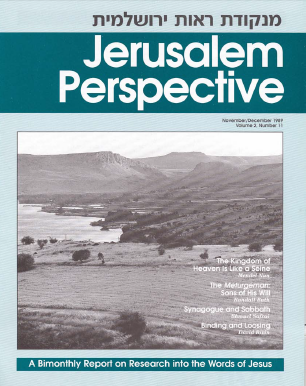How to cite this article: David N. Bivin, “‘Binding’ and ‘Loosing’ in the Kingdom of Heaven,” Jerusalem Perspective 23 (1989): 12-13 [https://www.jerusalemperspective.com/2433/].
Revised: 28-Dec-2012And I will give unto thee the keys of the kingdom of heaven: and whatsoever thou shalt bind on earth shall be bound in heaven: and whatsoever thou shalt loose on earth shall be loosed in heaven. (Matt. 16:19; KJV)
The Hebrew verbs אָסַר (’āsar, “bind”) and הִתִּיר (hitir, “loose”) each appear with more than one meaning in the Hebrew Bible. The verb אָסַר (’āsar) can mean “tie” as in Judges 15:12 and 16:11; “imprison” as in 2 Kings 17:4; “hitch” (a cart, wagon or chariot) as in Genesis 46:29; and “tether” as in Genesis 49:11; while the verb הִתִּיר (hitir) can be the exact opposite of ’āsar in each of its senses.
By the time of Jesus, ’āsar had acquired the additional meaning “forbid,” and its antonym, hitir, had acquired the meaning “permit.” These are the meanings most often found in rabbinic literature.
Jewish sages were called upon constantly by their community to interpret scriptural commands. The Torah forbids working on the Sabbath, for instance, but it does not define what constitutes work. As a result, the sages were required to rule on which activities were permitted on the Sabbath. They “bound,” or prohibited, certain activities, and “loosed” or allowed, others.
Paid Content
Premium Members and Friends of JP must be logged in to access this content: Login
If you do not have a paid subscription, please consider registering as a Premium Member starting at $10/month (paid monthly) or only $5/month (paid annually): Register
One Time Purchase Rather Than Membership
Rather than purchasing a membership subscription, you may purchase access to this single page for $1.99 USD. To purchase access we strongly encourage users to first register for a free account with JP (Register), which will make the process of accessing your purchase much simpler. Once you have registered you may login and purchase access to this page at this link:

































































































Comments 1
Muy Bueno el articulo que deja varias perspectivas de enseñanza, el origen de la instrucción hebrea y la manera en que se aplicaba, y Yeshua lo aplicao y aun sus talmidim. Todah